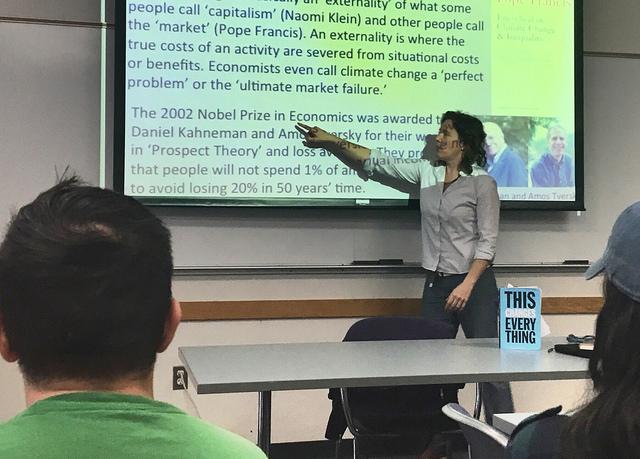Briefly addressing global climate change
Marilyn Vogel, Ph. D., hosted the Brown Bag workshop about global warming at Diablo Valley College on March 31, 2016.
April 7, 2016
The words ‘global warming’ bring to mind images of soaring global temperatures, coastal flooding, and general environmental chaos. However, global warming impacts far more than just the environment. The damage mankind has created upon the global ecosystem could bring economic and geopolitical disaster.
Marilyn Vogel, professor of geography at Diablo Valley College, led a brown bag workshop on Thursday, March 31, entitled “Global Warming: Representational, Economic and Psychological Dimension,” which examined the far-reaching effects of anthropogenic global climate change.
Vogel, calls global climate change the “greatest existential threat humans have ever faced,” highlighted quotes from her favorite authors such as Pope Francis, George Marshall, and Naomi Klein.
She pointed out that climate change is a huge economic issue, saying “unmitigated climate change is going to cost a lot of money, and how this works is that people spend money on stuff like food, which is weather dependent.”
Her view is that climate change is causing and will cause wars, mass migration, slavery and other types of suffering. That it’s a psychological, as well as spiritual issue.
Essentially, climate change creates dramatic shortages in the supply of basic resources like food, water, and even habitable land. This will cause wildly inflated global food prices in the best case, and foster global conflict in the worst. As a current example, the pentagon has cited a severe drought, caused by climate change, as one of the major causes of the Syrian rebellion.
She concluded by stating that rising sea levels are reaching magnitudes that people can now see; this is something that is happening now, not in a few centuries’ time. A headline by the Los Angeles Times read that 13.1 million U.S. coastal residents could face flooding because of rising sea levels.
To put it in the most optimistic way possible, mankind faces a grave and daunting challenge to its very survival.
Vogel highly recommends becoming further involved and informed by listening to a podcast by Bill McKibben, titled “Earth: Making Life on a Tough New Planet.”








































































